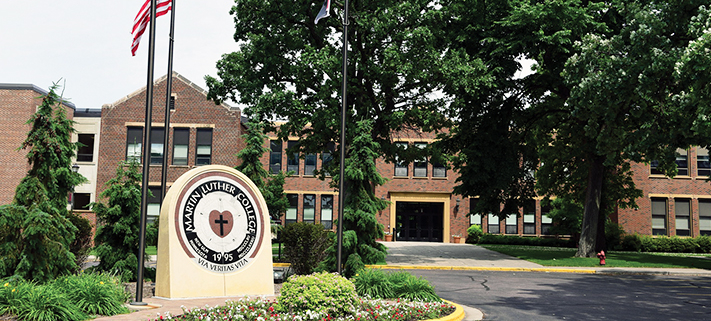A step toward future ministry: Part 2
Jesus says the harvest is plentiful but the workers are few.
John A. Braun
Some congregations grow weary of calling a new pastor. Today congregations call multiple times over months and, in some cases, even years. Schools scramble to find teachers to fill classrooms even after new graduates are assigned. Most of us have some personal experience or knowledge of the shortage of pastors and teachers.
Ross Stelljes has been recruiting young men and women for the public ministry for 11 years. He was an admission counselor for Martin Luther College (MLC), New Ulm, Minn., until he accepted a call to serve as professor of theology at MLC earlier this summer. Before he stepped into the classroom, I asked him to share his thoughts about recruiting future pastors and teachers.
Insights from a recruiter
You won’t get an argument from him about the need for more pastors and teachers. He says, “What Jesus said still applies today: ‘The harvest is plentiful but the workers are few.’ Besides that, right now in WELS we certainly have a shortage of both pastors and teachers, and this at a time when our Lord seems to be opening all kinds of new and amazing doors for our church body to share Christ with the world.”
Stelljes shared his recruiting responsibility with three other full-time counselors. They answer questions about academic majors, financial aid, transferring to other schools if ministry is not what a student wants, dorm life, and sports. He says, “One think that I think is on a lot of people’s minds but only a few blurt it out is: What if I feel so sinful or unworthy?” We need to confess that no called worker is worthy except by the grace and forgiveness of Christ.
In all those questions, he notes, “The great majority come [to MLC] because, at least to some extent, the Holy Spirit has created in their hearts a love for their Savior and his Word, and a desire to serve.” Over the years he has observed that many start at MLC who are “by no means convinced that this is for sure where they belong. But at least they’re willing to give is a try. And it’s exciting to see where that leads many of our students!” Stelljes notes, “Our retention rate is around 90 percent, which is quite strong compared to other colleges and universities.”
What changes them to stay and pursue ministry? Says Stelljes, “Their attitudes are changed. Daily chapel opportunities, the religion classes, having all classes taught from a Christ-centered worldview, learning in this environment . . . is like a ‘ministry slow cooker.’ The Holy Spirit uses all these things to grab hold of students’ hearts and change them. The ministry bug bites them, and they grow in their ministry mindset. More and more they treasure what Christ as done for them, that he came not to be served but to serve, and more and more they want to follow his loving lead.”
Why do they take that first step to come? After 11 years of talking with students, Stelljes observes, “There are all kinds of motivating factors, some more sanctified than others. Some come because they recognize how the Lord has influenced them through their called workers and they want to influence others in the same way. I often hear statements like this: ‘I want to help people just as my pastor helped me.’ ‘My fifth grade teacher made learning exciting; I want to be like her.’ ‘My principal inspired me to want to be a leader like that.’ A lot of them come because they were encouraged to think about it by the people in their lives whom they respect: parents, grandparents, members of their congregation, pastors, or teachers. Some come because they have no idea what vocation to pursue, but they can at least start in a solid, Christian environment. Some come because they want to keep playing football or another sport. Some come in hopes of finding a spouse who shares the same faith. I’m sure I haven’t exhausted the list!”
He continues, “A difficult part for me is helping some students see that their perceived barriers are just that: perceived. For instance, public speaking is probably the most common barrier I hear young men bring up when I ask them what they think about becoming a pastor. And I can relate, because that was definitely fear #1 on my long list when I was their age. But I tell them I’m like the poster child example of someone who, through training and experience, has grown to actually like public speaking. Still, I often find it difficult to convince some that this is a perceived barrier that they too can likely overcome.”
Stelljes says some of the most interesting interviews are with students who have suffered serious tragedy, hardship, or loss. “They usually seemed a little more mature in their faith and appreciative of what a solid rock they have in Christ and his Word. And every one of them strongly agreed when I asked them if, in hindsight, they could see how even through those hardships God had brought them blessings.”
And the most rewarding? “Some of the most rewarding ones were the students who came in to inform me that they had decided on MLC and ministerial training even though they had been offered huge scholarships to go elsewhere. For instance, one young man turned down a scholarship with full tuition and housing to pursue pastoral studies at MLC. What a powerful statement he made to his fellow classmates and to all of us: That it’s not all about money; it’s about how you feel you can best serve.”
What can FIC readers do?
Stelljes reminds us all, “Jesus said, ‘Ask the Lord of the harvest, therefore, to send out workers into his harvest field’ (Matthew 9:38). So, pray for more workers. Also, remember that you are all recruiters for public ministry. Never underestimate the impact you can have by simply pulling a young person aside who you think has the gifts and telling him that and encouraging him to give public ministry some thought. Also, remember that our young people see the respect you show toward the office of the public ministry, which leaves an impression on them.”
Recruiting the next generation to be pastors and teachers is important. Says Stelljes, “Our Savior’s words still ring true today: ‘The harvest is plentiful but the workers are few’ (Matthew 9:37). Jesus told us to pray that he send out more workers (v. 38). And he normally uses people like you and me as agents in carrying out this recruiting work.”
Jesus spoke those words when he saw the crowds “harassed and helpless, like sheep without a shepherd” (v. 36). What do we see? Congregations and schools in need of more pastors and teachers to preach, to teach, to lead, to comfort, and to encourage. We see young men and women who have the talent to do the work. Encourage them. One way may be to share this article with that young man or woman you think could be tomorrow’s pastor or teacher.
“Remember that you are all recruiters for public ministry.”
John A. Braun is the executive editor of Forward in Christ and a former college recruiter.
Student quotes from this article originally appeared in KnightWatch, MLC’s recruitment magazine for high school students. Thanks to Laurie Gauger-Hested for gathering and providing the information. Learn more about MLC at mlc-wels.edu.
This is the last article in a two-part series on encouraging young men and women to consider the public ministry.
SUBMIT YOUR STORY
Do you have a manuscript, idea, or story from your own life you’d like to share for use in Forward in Christ or on wels.net? Use our online form to share it to our editorial office for consideration.
SUBSCRIBE TO FORWARD IN CHRIST
Get inspirational stories, spiritual help, and synod news from Forward in Christ every month. Print and digital subscriptions are available from Northwestern Publishing House.
Author: John A. Braun
Volume 105, Number 10
Issue: October 2018
Copyrighted by WELS Forward in Christ © 2021
Forward in Christ grants permission for any original article (not a reprint) to be printed for use in a WELS church, school, or organization, provided that it is distributed free and indicate Forward in Christ as the source. Images may not be reproduced except in the context of its article. Contact us





